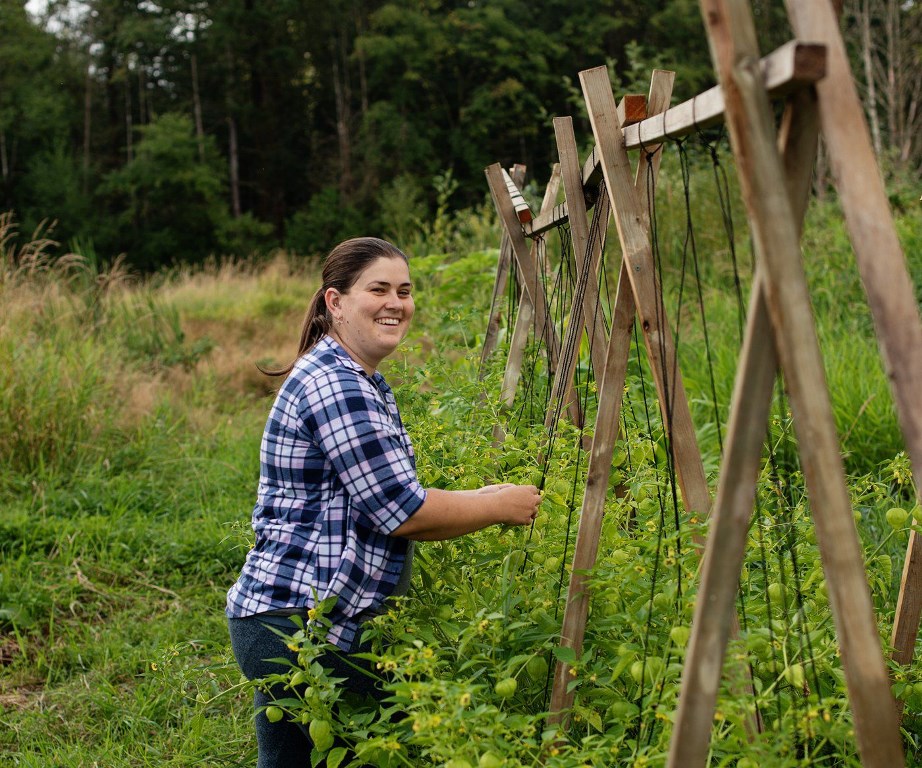Warning: This article discusses depression, anxiety, PTSD, and self-harm.
Many things can spell the last straw for an exhausted farmer â a crop that doesnât work out, a few too many days working in a row. For Kristen Penhall, it was a comment about the number of carrots in one of her vegetable boxes.
Penhall, a farmer in Langley, B.C., runs Naturally Good Vibes as primarily a one-person operation. She makes her living from Community Supported Agriculture shares, meaning she pre-sells produce boxes to people in her community. During her second season, she was dealing with a health issue that required multiple surgeries â a 10-month period that was equally hard on her mental health. Yet she continued to work. Someone, who she emphasizes wasnât trying to be malicious with their feedback, said Penhallâs box didnât have enough carrots, especially in comparison to ones from larger, older, family-run operations that theyâd seen.
âI just remember thinking like, âOoh, wow. Like I donât think you understand that I am not able to compete with a family farm ... that has been in the family for seven generations,â and I was in my second year,â she said.
âI find that often ... Itâs actually the general perspectives of the public that can add to mental health issues.â
Penhall says she has found ample support and connection in the farming community, but that accessible farming-specific resources for mental health still seem to be lacking. She says everything that makes farming great, like the deep connection you feel to the land and the daily gamble of planting and harvesting, also makes it a unique challenge.
There are numbers to support the observations Penhall, who has experienced PTSD and OCD, makes about farmers and mental health. A study from the University of Guelph found that 35 per cent of farmers meet the classification for depression, 58 per cent of farmers meet the classification for anxiety and depression, 45 per cent of farmers have high stress levels, and 67 per cent of farmers are more susceptible than the general population to chronic stress, which can lead to burnout and associated health concerns.
Paul Wartman is trying to address that with a new series on mental health through the National Farmers Union (NFU) called Collective Care. The month-long series will host workshops and Zoom chats for farmers and the greater community.
Wartman, a farmer himself in Nova Scotia, has a background in community facilitation. The workshops, he says, will aim to give space to discuss self-care practices, challenges, and provide context on the varied experience of farmers.
âOur membership has specifically told us anti-Black racism is a mental health issue ... itâs beyond just individual action. It includes systemic policy thatâs been put in place, it includes infrastructure, and larger than us pieces,â he said.
âItâs tying in the individual experience with mental health to the broader culture and systems.â
Wartman gives a nod to the youth in the NFU for inspiring the series â he says he sees a lot of awareness in younger farmers, especially those closer to urban centres. Wartman says stigma obviously still exists in cities, but that it can be especially prevalent in rural areas.
Top it all off with the pandemic, and Wartman says there are many nuanced challenges and discussions that need to happen in the farming community. The timing of the workshop is important, he says. Spring can be an especially difficult time for the community â things start growing, life is especially busy.Â
âThis is the time when people really started considering self-harm, and potentially taking their lives,â he said.
Penhall says at the end of the day, she feels grateful to be in the supportive farming community she has found. She hopes by continuing to be open about her own experience with mental health, others will be encouraged to do the same, and more accessible, fathomable supports will become available.
âI recently was asked by a doctor, âWhat do you do?â and when I replied, âFarmer,â he asked again ... in disbelief, and then replied, âCute.â I doubt he would have said that to a farmer who fit the stereotype he had in his mind,â she said.
âUntil we see that farmers are becoming a more diverse group of people, we wonât be able to truly see them and therefore give them the support they need.â
If you or someone you know is in crisis, there is help. Visit Crisis Services Canada online, or call the national suicide prevention helpline at 1-833-456-4566 or Kids Help Phone at 1-800-668-6868.




